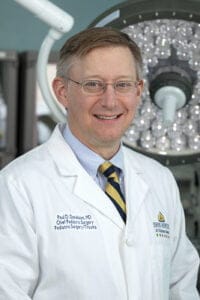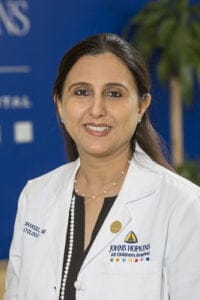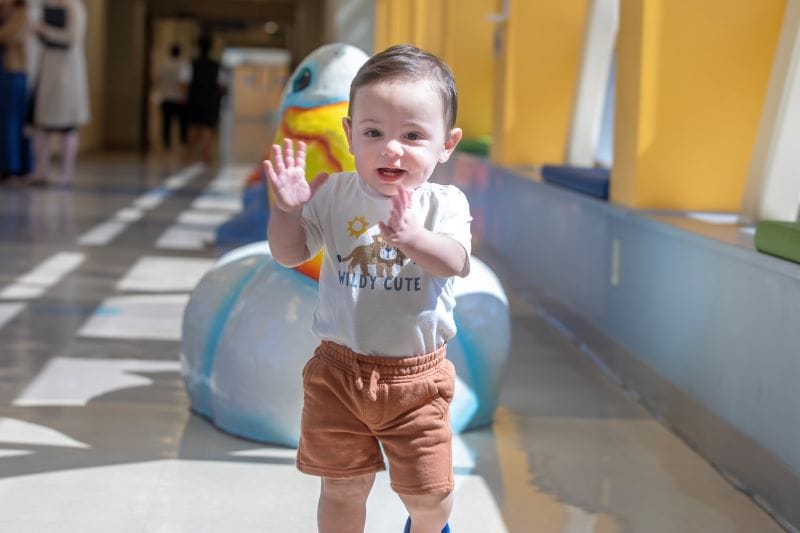Andres’ Birth Defect and Battle with Gastroschisis
Pediatric surgeon Paul Danielson, M.D., at Johns Hopkins All Children's Hospital, has often been called in the middle of the night to perform lifesaving surgery. But when Andres was born in 2022, it was a surgical scenario that Danielson had never experienced in his medical career.
Andres had gastroschisis, a birth defect that occurs when a baby's intestines protrude through a hole in the abdominal wall.
‘Not a routine gastroschisis case'
When Danielson arrived at the hospital, he quickly realized that this was not a routine gastroschisis case. Andres’ intestines not only developed outside the abdominal cavity but were adhered firmly to his mother‘s placenta, requiring surgical intervention right in the delivery room to transect the intestines in order for the baby to be delivered.
“We had a situation where the baby was stuck in the birth canal and I had to reach up through the birth canal to divide the nonviable intestine that was tethering the baby,” said Danielson.
‘It Was Scary’
“The baby basically came out and his intestines and the placenta did not,” Andres’ mother, Allison says. “I had no advance warning. It was not obvious in any of the scans leading up to the birth.”
Once in surgery, Danielson had to cut away a significant portion of Andres’ intestines to separate him from Allison.
He was immediately moved from Bayfront Baby Place, where he was born to the operating room at Johns Hopkins All Children’s, just a short elevator ride away.
‘Critical and Fragile’
He was moved to the Level IV Johns Hopkins All Children’s neonatal intensive care unit (NICU) after surgery. That’s where Fauzia Shakeel, M.D., a neonatologist and director of the Johns Hopkins All Children’s Intestinal Rehabilitation Program took over his care.
“Andres was very critical and fragile in the NICU and due to his massive intestinal resection. He has short-gut syndrome. That’s when a child has less than 25% of their intestines or are dependent on IV nutrition for more than 60 days after intestinal resection.”
At 6 weeks of age, doctors performed another surgery to assess how much of his intestines were still in place. “He was also missing his ileocecal valve that sits at the junction of the small intestine and the large intestine. It is made up of muscle tissue that contracts and relaxes to control the flow of food from the small intestine into the large intestine.”
“There were many ups and downs during his eight-month stay in the NICU,” Shakeel said. “Every patient is different in their own unique way, but if you provide the right multidisciplinary specialty care and support the family, they can have a great outcome.
‘A Heartwarming Case’
Today, his growth parameters are normal. He eats almost anything he wants, and his IV nutrition has been discontinued.
“I am so thankful for the team that cared for Andres and how in tune the physicians were with his case every single day,” Allison said. “God is good! He’s on the road to having a very normal life.”

Dr. Danielson is associate dean of clinical affairs at Johns Hopkins All Children’s Hospital. Dr. Danielson also began serving as president of All Children’s Specialty Physicians (ACSP) in 2023, first on an interim basis and then permanently. A clinical professor of surgery, he has chaired the Johns Hopkins All Children's Department of Surgery since 2020 and was interim chair from 2018 to 2020. He specializes in general surgery and was an early adopter of minimally invasive surgical techniques, developing expertise in treating chest wall deformities.
Dr. Danielson earned his medical degree from the University of Rochester where he also completed the residency program in general surgery through Strong Memorial Hospital. He completed a research fellowship in pediatric surgery at Massachusetts General Hospital/Harvard University and a clinical fellowship in pediatric surgery at Children’s Hospital Los Angeles. Before joining Johns Hopkins All Children’s, he served as director of pediatric surgical oncology at the University of Massachusetts.

Dr. Shakeel specializes in neonatology with the Johns Hopkins All Children's Maternal, Fetal & Neonatal Institute. She joined the medical staff in 1999. She has a clinical focus on nutritional care for neonates to improve clinical outcomes in the neonatal intensive care unit (NICU) and improving clinical outcomes in infants with short bowel syndrome at risk of intestinal failure. She is also chair of the Johns Hopkins All Children’s Care Under Intestinal Rehabilitation Excellence (CUIRE) intestinal rehabilitation program.
Dr. Shakeel is an assistant professor for the Department of Pediatrics at the Johns Hopkins University School of Medicine. In addition to serving on multiple hospital committees including Ethics, Nutrition, Advocacy and more, Dr. Shakeel is very involved with the Armstrong Institute for Patient Safety & Quality and has completed Lean Sigma Green Belt training, the Patient Safety Certificate Program and the Leadership Academy Course.
*Presented by Johns Hopkins All Children's Hospital


